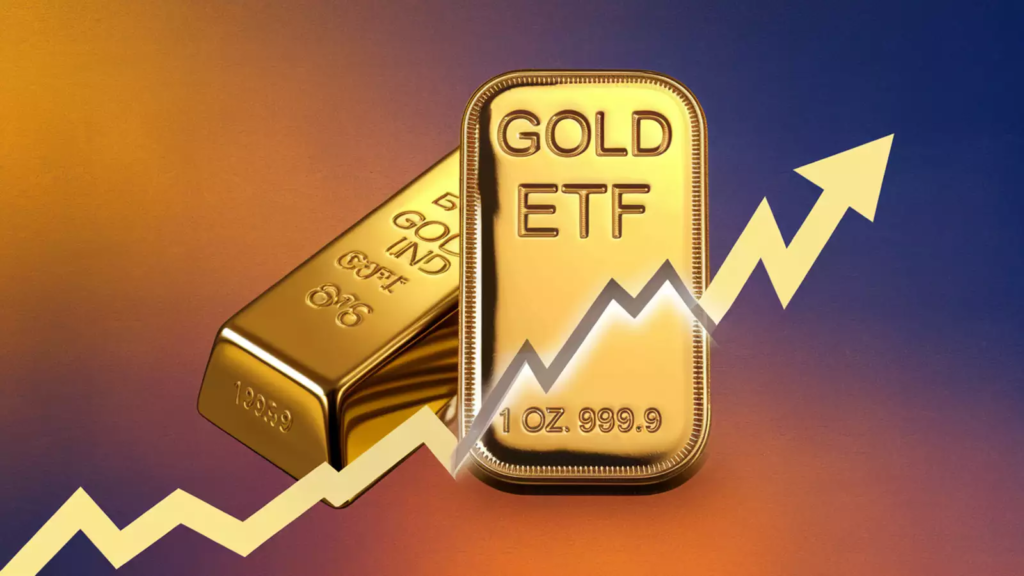Gold ETF is an exchange-traded fund that tracks the price of gold. These funds allow investors to buy shares that represent a specific quantity of gold without the need to physically store or insure the metal. Gold ETFs trade on stock exchanges just like shares of individual companies, making them highly liquid and accessible to a wide range of investors.

Investing in Gold ETFs: A Smart Way to Diversify Your Portfolio
Gold has long been considered a safe-haven asset, offering protection against inflation, economic uncertainty, and currency fluctuations. While traditional methods of investing in gold, such as buying physical bullion or coins, remain popular, Gold Exchange-Traded Funds (ETFs) provide a more convenient and cost-effective way to gain exposure to this precious metal.
Gold ETF have delivered up to 40% returns in the past year, with inflows surging 486% monthly. UTI Gold ETF led with 39.75% returns. Rising uncertainty, U.S. trade tariffs, and inflation concerns have boosted demand. AUM grew 87% YoY, reflecting strong investor interest.
Sources: Economic Times
Why Invest in Gold ETF?
Invest for below reasons.
Diversification – Gold has a low correlation with traditional asset classes like stocks and bonds, making it an excellent diversification tool.
Hedge Against Inflation – Historically, gold has maintained its value over time, serving as a hedge against rising inflation in India.
Liquidity – Unlike physical gold, This can be bought and sold easily during market hours on Indian stock exchanges.
Cost-Effective – Investing in Gold bond ETFs eliminates costs related to storage, security, and making charges, which are typically associated with owning physical gold.
Regulated and Transparent – Gold bond ETFs in India are regulated by SEBI, ensuring transparency and investor protection.
How to Invest in Gold ETF?
- Choose a Demat and Trading Account – Investors need a Demat account and a trading account with a registered broker to buy and sell Gold Exchange-Traded Funds.
- Select the Right Gold ETF – Various Gold Exchange-Traded Funds are available in India, such as those offered by major asset management companies (AMCs).
- Place an Order – Investors can buy Gold Exchange-Traded Funds at market price during trading hours on NSE or BSE.
- Monitor and Rebalance – Like any investment, Gold Exchange-Traded Funds should be reviewed periodically to ensure they align with investment goals.
Best Gold ETFs in India
As per the sources of Tickertape,
- Nippon India ETF Gold BeES – A popular Gold digital ETF with high liquidity.
- SBI Gold ETF – efficient & cost effective for gold investor in Indian market.
- Kotak Gold ETF – Closely match the return of gold in domestic market.
- HDFC Gold Exchange Traded Fund – Track the price of Gold in India.
- UTI Gold Exchange Traded Fund – The fund is designed to provide returns that closely correspond to the price of physical gold.
Risks to Consider
- Market Volatility – The price of gold can be volatile, influenced by economic events, geopolitical tensions, and RBI policies.
- Expense Ratios – While relatively low, Gold Digital ETFs do have management fees that can impact returns over time.
- Tax Implications – In India, Gold Digital ETFs are subject to capital gains tax, depending on the holding period.
Gold ETF vs Physical Gold: Which is the Better Investment?
Gold Exchange-Traded Funds and physical gold both offer ways to invest in gold, but they cater to different investor preferences. Here’s a comparison to help you decide which is better for you:
Gold Exchange-Traded Funds
✔ Liquidity & Convenience – Easily bought and sold on stock exchanges. No need to worry about storage.
✔ Lower Costs – No storage fees or insurance costs. ETFs usually have low expense ratios.
✔ Tax Efficiency – Often more tax-friendly than physical gold in some regions.
✔ Transparency – Prices track gold’s market price accurately, with minimal markup.
❌ No Physical Possession – You can’t use it in emergencies or personal needs.
❌ Counterparty Risk – Relies on fund managers and custodians holding actual gold.
Physical Gold (Coins, Bars, Jewelry)
✔ Tangible Asset – You own it outright and can use it as a store of value.
✔ No Counterparty Risk – Not dependent on a financial institution.
✔ Useful in Crises – Can be used directly in extreme financial situations.
❌ Storage & Security Costs – Requires safekeeping, which may add costs.
❌ Liquidity Issues – Selling may involve dealer fees, purity verification, and lower resale prices.
❌ Premiums & Taxes – Higher purchase premiums and potential wealth taxes in some regions.
Which is Better?
- For investors seeking liquidity, ease of trading, and lower costs go to Gold Digital ETF
- For those who want physical ownership, protection from financial system risks, and long-term wealth preservation → Physical Gold
A hybrid approach—holding some physical gold for emergencies and Gold Digital ETFs for investment growth—might be the best strategy. What’s your investment goal?
Final Thoughts
Gold ETFs offer an excellent way for Indian investors to gain exposure to gold without the hassle of owning physical metal. They provide liquidity, cost efficiency, and diversification benefits, making them an attractive addition to any investment portfolio. However, investors should carefully assess their risk tolerance and investment objectives before allocating funds to Gold Exchange-Traded Funds.
Whether you’re looking to hedge against inflation or diversify your holdings, Gold Exchange-Traded Fund can be a strategic and valuable asset in your financial portfolio in India.
Table of Contents
Know more investments:
Latest Posts
- Active Funds vs Passive Funds – Differences, Performance, Risk, and Costs Compared
- Pension Plans In India: Types, Benefits & Which One To Choose
- Equity Funds vs Mutual Funds: Understanding the Differences and Choosing the Right Investment
- Hybrid Funds – Balancing Risk and Reward In Your Portfolio
- Debt Funds: Types, Benefits & Returns